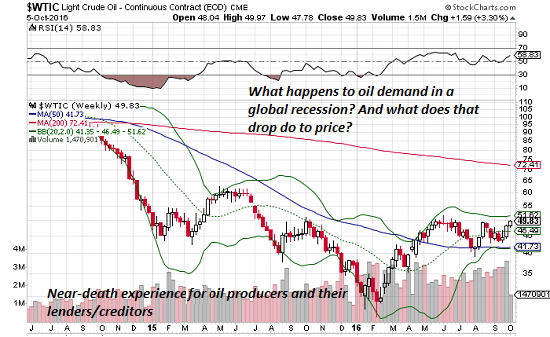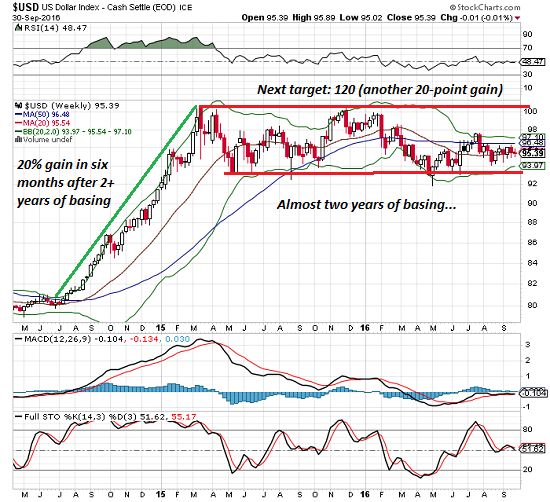The "Nuclear Options:" Oil Pinned Below $30/barrel, US Dollar Rising
October 6, 2016
These two nuclear options could strike the global economy even without any planning.
The "nuclear option" is the extreme-measures button you push when conventional approaches have failed and you're facing certain defeat. In terms of upsetting the global economy's precarious balance, there are two nuclear options short of actual nuclear war: pinning oil to $30/barrel or even lower for an extended period, and triggering a sustained rise in the US dollar. (USD)
Let's glance at weekly charts of oil (WTIC) and the USD:


Oil producers and their lenders/creditors had a near-death experience when oil plunged to $27/barrel early in 2016. At $30 or less per barrel, revenues from oil sales are no longer sufficient to support enormous domestic welfare state spending and debt service.
It's pretty simple: pin oil at $30/barrel for a year and you destabilize every nation that's dependent on oil sales for its revenues. Oil producers in more economically diversified nations such as Canada and the US go bankrupt or drastically curtail exploration and development to survive.
A bunch of stuff is no longer affordable to oil-revenue-dependent nations once oil is pinned to $30/barrel for months on end: massive social welfare programs, servicing sovereign debt, waging war, either directly or via proxies, and propping up cratering currencies.
Cratering currencies open up another Pandora's Box of financial and economic horrors. Which brings us to US dollar, which gained 20% in a mere six months in late 2014.
Foreign exchanges rates are zero-sum: all currencies can't go up together or drop together; something goes up when something else drops, and vice versa.
Should the USD finish its basing and soar another 20% in a few months, other currencies will lose purchasing power--some more than others, some less, but some currencies will take major hits to their global purchasing power if the USD repeats its "build a base for two years and then gain 20%" pattern.
When currencies rapidly lose value, bad things tend to happen. Rather than lose purchasing power by holding the currency, investors flee, selling the currency and moving their capital into other currencies or assets, i.e. capital flight.
Nations hit with depreciating currencies are often tempted to defend their currencies, and this defense often drains their foreign reserves while doing little to stem the capital flight.
While a devalued currency makes a nation's exports cheaper to buyers with stronger currencies, it also increases the costs of imports such as food and energy.
What happens to demand for oil in a deep global recession? It tends to plummet, and unless production falls by the same amount, then price tends to plummet as well, as supply stays stubbornly higher than cratering demand.
These two nuclear options could strike the global economy even without any planning.
Once the global economy tips into recession, oil may fall under its own weight and the dollar
may gain ground as other currencies fall.
Join me in offering solutions by
becoming
a $1/month patron of my work via patreon.com.
My new book is #8 on Kindle short reads -> politics and social science: Why Our Status Quo Failed and Is Beyond Reform ($3.95 Kindle ebook, $8.95 print edition) For more, please visit the book's website.
NOTE: Contributions/subscriptions are acknowledged in the order received. Your name and email remain confidential and will not be given to any other individual, company or agency.
|
Thank you, Ken H. ($50), for your outrageously generous contribution to this site-- I am greatly honored by your steadfast support and readership. |

Discover why Iím looking to retire in a SE Asia luxury resort for $1,200/month. |